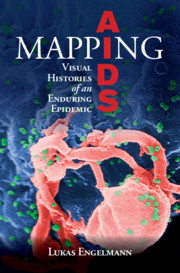Mapping AIDS
Visual Histories of an Enduring Epidemic
£90.00
Part of Global Health Histories
- Author: Lukas Engelmann, University of Edinburgh
- Date Published: November 2018
- availability: In stock
- format: Hardback
- isbn: 9781108425773
£
90.00
Hardback
Other available formats:
Paperback, eBook
Looking for an inspection copy?
This title is not currently available on inspection
-
In this innovative study, Lukas Engelmann examines visual traditions in modern medical history through debates about the causes, impact and spread of AIDS. Utilising medical AIDS atlases produced between 1986 and 2008 for a global audience, Engelmann argues that these visual textbooks played a significant part in the establishment of AIDS as a medical phenomenon. However, the visualisations risked obscuring the social, cultural and political complexity of AIDS history. Photographs of patients were among the earliest responses to the mysterious syndrome, cropped and framed to deliver a visible characterisation of AIDS to a medical audience. Maps then offered an abstracted image of the regions invaded by the epidemic, while the icon of the virus aspired to capture the essence of AIDS. The epidemic's history is retold through clinical photographs, epidemiological maps and icons of HIV, asking how this devastating epidemic has come to be seen as a controllable chronic condition.
Read more- Offers an innovative visual approach to the history of HIV and AIDS
- Uses a new methodological framework to demonstrate the relevance of photographs, maps and models in furthering medical knowledge
- Positions the AIDS Atlas as a way to engage with the history of the epidemic
Reviews & endorsements
'A persuasive rethinking of nearly four decades of medical and social upheaval, Mapping AIDS cleverly juxtaposes three visual genres - photographs, maps, and viral models - to explain how people, places, and pathogens take on medical and moral meanings.' Steven Epstein, Northwestern University, Illinois
See more reviews'From the photographic archives of the early North American epidemic, to the emerging cartography of a global pandemic, to the rendering of the HIV virus itself, Mapping AIDS demonstrates the central role of visual media in crafting scientific knowledge, social meanings, and biomedical responses to disease, with powerful consequences for good and for ill.' Jeremy A. Greene, The Johns Hopkins University
'This thoughtful and ingeniously argued study tracks AIDS from its beginnings as a nameless condition in a few individuals as it evolved into a recognized social thing, an entity with a legitimating mechanism, and therapeutic and bureaucratic responses.' Charles Rosenberg, Harvard University, Massachusetts
'Engelmann's argument is an interesting one that highlights not only some of the many ways to view an epidemic, but also the challenges associated with contextualizing theories, particularly ones that cross cultural boundaries.' Janet Greenlees, Technology and Culture
Customer reviews
Not yet reviewed
Be the first to review
Review was not posted due to profanity
×Product details
- Date Published: November 2018
- format: Hardback
- isbn: 9781108425773
- length: 266 pages
- dimensions: 235 x 158 x 15 mm
- weight: 0.57kg
- availability: In stock
Table of Contents
List of figures
Acknowledgements
Introduction
1. Seeing bodies with AIDS
2. Seeing spaces of AIDS
3. Seeing HIV as AIDS
Epilogue: the end of the AIDS crisis?
Bibliography
Index.
Sorry, this resource is locked
Please register or sign in to request access. If you are having problems accessing these resources please email [email protected]
Register Sign in» Proceed
You are now leaving the Cambridge University Press website. Your eBook purchase and download will be completed by our partner www.ebooks.com. Please see the permission section of the www.ebooks.com catalogue page for details of the print & copy limits on our eBooks.
Continue ×Are you sure you want to delete your account?
This cannot be undone.
Thank you for your feedback which will help us improve our service.
If you requested a response, we will make sure to get back to you shortly.
×









